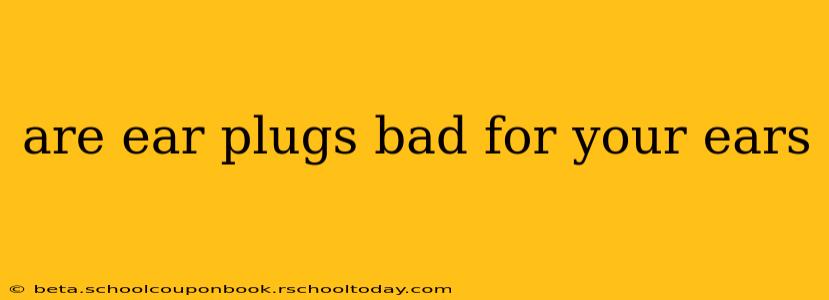Are Earplugs Bad for Your Ears? Separating Fact from Fiction
The question of whether earplugs are bad for your ears is a complex one, often shrouded in misinformation. The truth is, properly used earplugs are generally not bad for your ears; in fact, they can be incredibly beneficial to your hearing health. However, misuse or using the wrong type of earplug can lead to problems. Let's delve into the details.
Can Earplugs Damage Your Ears?
The short answer is: yes, potentially, but this is largely avoidable. The risk of earplug-related damage stems primarily from improper use and selection. For example:
- Improper insertion: Inserting earplugs too forcefully can damage the delicate skin of your ear canal, leading to irritation, pain, or even infection.
- Using the wrong size or type: Earplugs that are too large or too small can be uncomfortable and ineffective, potentially increasing your risk of exposure to harmful noise. Different types of earplugs (foam, silicone, custom-molded) suit different needs and ear shapes.
- Leaving earplugs in for extended periods: While some earplugs are designed for extended wear (like custom-molded ones), others are intended for shorter periods. Leaving earplugs in for too long can create a breeding ground for bacteria and increase the risk of infection.
- Using dirty or damaged earplugs: Reusing dirty earplugs or using earplugs that are torn or damaged can introduce bacteria and other contaminants into your ear canal.
What are the Benefits of Using Earplugs?
The benefits of using earplugs far outweigh the potential risks when used correctly. They are crucial for protecting your hearing from damaging noise levels, including:
- Protecting against noise-induced hearing loss (NIHL): Prolonged exposure to loud noises can permanently damage the delicate hair cells in your inner ear, leading to NIHL. Earplugs provide a crucial barrier against these harmful sounds.
- Reducing discomfort from loud noises: Earplugs can reduce the intensity of loud noises, making them more tolerable and preventing discomfort or pain. This is especially important in environments with loud, consistent noise.
- Improving sleep quality: Earplugs can block out disruptive noises, leading to better sleep quality. This is beneficial for individuals living in noisy environments or those sensitive to sound.
- Reducing tinnitus symptoms: For some individuals, earplugs can help reduce the perception of tinnitus (ringing in the ears) by lowering background noise levels.
What Type of Earplugs are Best?
Choosing the right type of earplug depends on your individual needs and the environment you're in. Some common types include:
- Foam earplugs: Disposable, inexpensive, and readily available. Effective for attenuating a range of sounds but require proper insertion for effectiveness.
- Silicone earplugs: Reusable, more comfortable for extended wear than foam, and offer a good level of noise reduction.
- Custom-molded earplugs: Made to fit your individual ear shape, offering the best comfort and noise reduction. These are ideal for musicians, frequent concert-goers, or those working in loud environments.
- Earplugs for swimming: Specifically designed to prevent water from entering the ear canal.
How Can I Prevent Earplug-Related Problems?
To minimize the risks associated with earplug use:
- Choose the right size and type: Select earplugs that fit comfortably and provide the appropriate level of noise reduction for your needs.
- Insert earplugs correctly: Follow the manufacturer's instructions for proper insertion.
- Clean your earplugs regularly: Clean reusable earplugs with mild soap and water after each use.
- Replace disposable earplugs after each use: Do not reuse disposable earplugs.
- Consult a hearing professional: If you experience any pain, discomfort, or infection, consult a doctor or audiologist.
In conclusion, earplugs are not inherently bad for your ears. When used correctly and responsibly, they offer significant protection against noise-induced hearing loss and other auditory problems. Choosing the right type of earplug and following proper hygiene practices are key to ensuring safe and effective use. Remember to consult a hearing professional if you have any concerns about your hearing or ear health.
